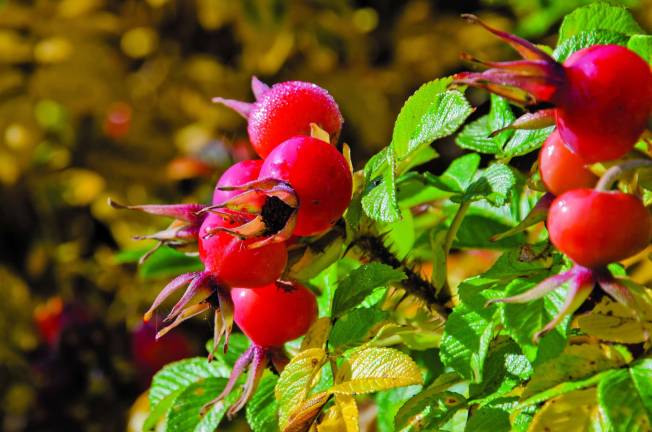Poetry and Vitamin C in wild rose hips

Once we learn to navigate the wall of green, a mysterious world is revealed. Within this wall, notice the brambles bearing clusters of beautiful little red berries. One of them is a wild rose hip, the fruit of a rose plant, with many small seeds inside it. Certain rose hips are better for you than others, but all contain Vitamin C, an antioxidant which shows large scale action against colds and flu.
On the borders of the woods, multiflora rose stands in almost every backyard, so common that to most people, it’s invisible. This particular species gets a bad rap because it is not native, and spreads easily. However by harvesting, we do our part in establishing potentials for native biodiversity to spring up.
On your winter walk, when you have found the brambles, look at the thorny plants: among the blackberry, raspberry and wineberry canes are clusters with a small red berry, each of which has a “crown.” Foraging in December may offer less in the way of variety, but it has this major advantage: few plants are producing fruit, multiflora rose being one of the last standing. That said, potentially confusing look-alikes include the red berry of oriental bittersweet, a vine that can climb 60 feet, and Japanese barberry, which has bitter-tasting red oblong berries – both of which make good medicinals.
Rose hips start out light red, and very hard to squeeze. When you can squeeze the berry between your fingers and it smashes, almost pops, you have in your hand a ripe rose hip. Taste it to see if it’s a bush you like; there is tremendous variation among plants. It’s worth noting that some can go “bad,” meaning the sugars within the hip have fermented. Eat too many and you might catch a buzz, or get a little nauseous, depending on your constitution.
After harvesting the hips, lay them to dry on an old screen, or keep them in a paper bag on your car’s dashboard, and shake them up every few hours. After a few days they will be ready to store. I recommend glass ball jars. Add dried rose hips to any tea mix, jam, or dessert. It’s easy to work with rose hips in a French press, and they sweeten up other bitter medicinal herbs. Gathering abundant Vitamin C to get you through winter is important. While no one dies of scurvy nowadays, deficiencies lead to fatigue, dry skin and hair, irritability, and sniffles. How convenient of this humble invasive to offer itself up during cold and flu season. Dan De Lion